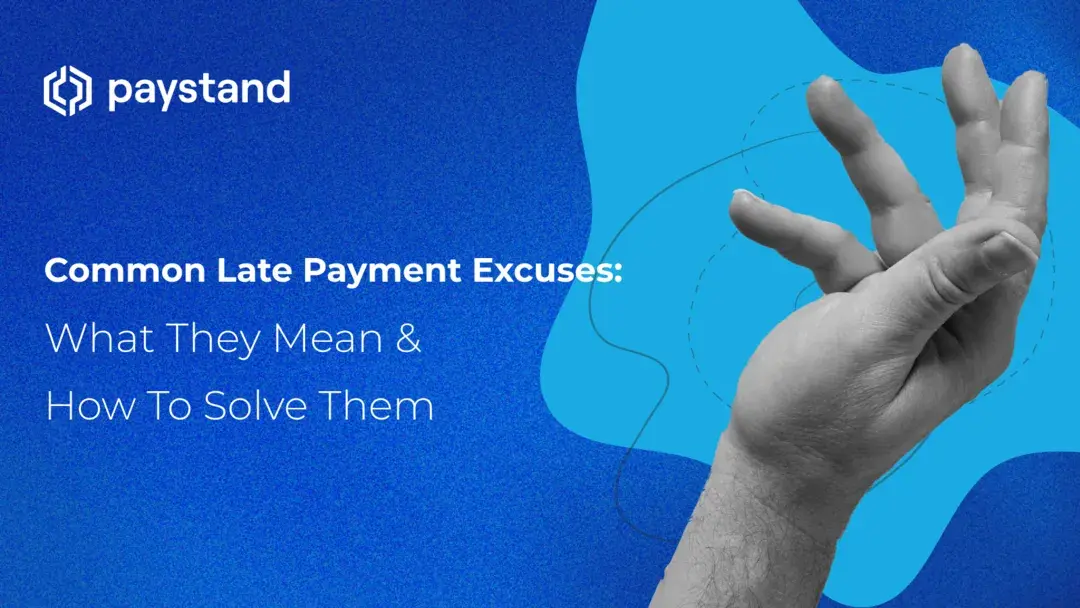Common Late Payment Excuses: What They Mean & How To Solve Them

The month is almost over. As you check the records, you realize there are still many invoices to complete. Some might not get paid on time, and a few could become bad debts. Plus, you carefully scrutinize every cent for budget requests because money is tight. It’s that time of the month when you hear the most common late payment excuses.
Late payments happen for various reasons. Customers tend to forget, mistakes on invoices arise, technology issues arise, and economic uncertainties lead clients to request more time. If you're dealing with checks, there's another set of possible delays from when the check is sent to when it's processed.
There are many excuses for late payments, so we decided to count them. Here are the top late payment reasons AR professionals have probably heard, what to do about them, and how to get paid faster.
"We Haven't Received the Invoice"
The most common reason for non- or late payment is clients saying they haven't received the invoice. Maybe that's true—after all, mail can get lost, and emails are often accidentally sent to spam. In some cases, customers haven't updated their physical or email addresses.
💡Tip: Double-check their address and email them an invoice to prevent this problem. Adding a payment portal with a "Pay Now" option can make things even faster since customers can immediately pay the invoice.
"The Company Information Isn't Correct"
Errors on the invoice can cause delays. Confirming clients' invoicing information while signing the contract or confirming an order is essential.
💡Tip: Opting for digital invoicing can reduce payment lags if errors slow down the process.
"Our System is Down"
A downside of digital processing is that technology sometimes fails, and clients can't send invoices immediately. However, downtime is usually a short-term problem. Experiencing a long-term technical outage that would affect payments is unlikely. Even if paying an online invoice isn't possible, calling to make a payment or sending a check are options. The payment will be logged once the system is running again.
💡Tip: Avoid this issue by asking about alternative payment methods. It is also helpful to take accurate banking detail notes.
"The Person Authorizing Payments is OOO"
Most AP departments have a single person authorizing payments. It's common for them to take vacations, especially during the holidays.
When signing a contract, it is essential to have the signatory's name and contact information on file, as well as a second point of contact.
💡Tip: You can ask when they will be back in the office to process the payment and whether there is an alternative method.
"We Already Paid the Invoice"
Some customers may believe they have already paid the invoice. This may be true, so reviewing payment reconciliation is crucial to ensure receipts and avoid invoice disputes. But sometimes, customers may forget about an invoice or believe they paid it when they paid another instead.
💡Tip: After ensuring your records are in order, send them a screenshot of your ledger and highlight what invoices they've paid. Then, send a copy of the unpaid invoice.
"The Goods or Services Weren't Delivered"
If goods weren't delivered or services weren't used, the customer has the right not to fulfill the invoice. That said, you must review your documentation.
Supporting documents proving that goods were sent or services delivered may exist—usually a purchase order, receipts, and delivery confirmations.
💡Tip: A clear line of documentation allows you to respond by emailing the information to the customer.
"We've Been Having Issues With Your System"
Many AR departments have shifted to digital invoicing, but not all payment systems are easy to navigate. Selecting easy-to-use programs is essential for a streamlined payment process.
💡Tip: Email a PDF of the invoice and link to potential payment methods, or include manual banking details. When this excuse for delayed payments becomes common, it's time to update your software or process.
"We Only Pay on a Specific Day Every Month"
Sometimes, there may be a miscommunication about the payment terms. Two companies with mismatched payment terms can strain customer relationships even if the terms are clearly stated on the invoice.
Most B2B transactions take 30 or 60 days, with some industries having a 90-day payment period. When signing up a new customer, include payment terms in the contract.
💡Tip: Ask about their payment process and how you can adjust your invoicing schedule to match. Whether you abide by your preferred terms or theirs, you can always schedule invoices to automatically go out on the correct dates and avoid these issues in the future.
"We Are Waiting on Customer Payments So We Can Pay You"
This excuse has always existed but becacme widespread during the prime pandemic. Supply chain disruptions often cause payment delays.
💡Tip: It's often better to give some stretch and ask when the customer expects to be paid. Then, you can schedule an invoice follow-up for that period.
"We're Having Cash Flow Problems"
This excuse is similar to the one above. The difference is that you're unlikely to get a firm payment date.
💡Tip: The best way to respond is to ask further why they cannot pay your invoice and if it's possible to estimate a payment date.
"The Owner Has Died"
This is a complicated scenario. Before focusing on the payment needs, extend your condolences. Let them know you have invoice-related documentation, and you can send them whenever they are ready. It's safe to expect a few weeks of delays, as typically, the business will need to re-verify your invoice.
"We Switched Banks, So There's a Delay"
The average waiting period for switching banks is around seven days. Of course, a bank change isn't an issue if you use an online portal or subscription payment option. Customers can add their information through the payment portal and pay immediately.
💡Tip: If the delay exists beyond that, you must ask more clarifying questions. In your follow-up, you'll want to send your bank details and ask how you will receive payment.
Get Paid Without Excuses
Preparing for every event that could delay payments is impossible—but you can optimize your process to reduce DSO. Key ways to reduce friction and speed up AR tasks are to:
- Provide a self-service payment portal
- Automate invoice follow-up, receipts, and collections
- Encourage ACH, eCheck, and digital payments
- Cut invoice errors with automated workflows
- Allow customers to save their payment details securely
If you're curious to learn more about the psychological factors behind payer behavior, check out our eBook: 'The Psychology of Payment Behavior.' Remember that understanding payer behavior is essential for optimizing cash flow and maintaining healthy relationships.







